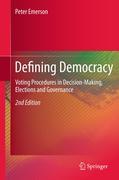
Defining democracy: voting procedures in decision-making, elections and governance
Emerson, Peter
Defining Democracy looks both at the theory of why and the history of how different voting procedures have come to be used – or not, as the case may be – in the three fields of democratic structures: firstly, in decision-making, bothin society at large and in the elected chamber; secondly, in elections to andwithin those chambers; and thirdly, in the various forms of governance, from no-party to multi-party and all-party, which have emerged as a result. Democracy is for everybody, not just a majority - this book explains the basis of a more consensual politics. Advocates more accurate voting methodologies beyond the simplistic majority rule. Shows how democracy is still evolving,e.g. through the use of computer applications. Outlines how consensual votingprocedures can play a vital part in any peace process. INDICE: Introduction.- Part I: Decision, Decision. 1 The Myths of MajorityRule. 2 The 'ifs' of Pluralist Decision-Making. Part II: Standing to Sit: Elections. 3 'Party-ocracies'. 4 The Candid Candidate. Part III: The Art of Governance. 5 The Elected Dictator. 6 I'm a Gnu. Appendices. References. Index.
- ISBN: 978-3-642-20903-1
- Editorial: Springer Berlin Heidelberg
- Encuadernacion: Cartoné
- Páginas: 500
- Fecha Publicación: 27/09/2011
- Nº Volúmenes: 1
- Idioma: Inglés
